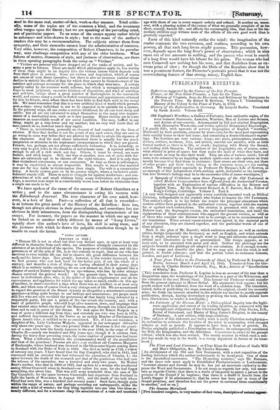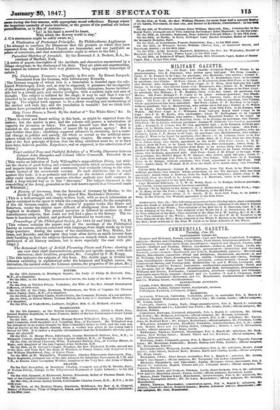PUBLICATIONS RECEIVED.
BOOKS.
Reflections suggested by the Career of the late Premier.
Trevor, or the New Suing Francis; a Tale for the Times. A History of Virginia, from its Discovery and Settlement by Europeans to the Present Time. By Robert R. Howison. Volume I. Containing the History of the Colony to the Peace of Paris, in 1768. History of the Reformation in Germany. By Leopold Ranke. Translated by Sarah Austin. Volume IlL Old England's Worthies; a Gallery of Portraits, from authentic copies, of the most eminent Statesmen, Lawyers, Warriors, Men of Letters and Science,
and Artists of our country. Accompanied by full and original Biographies,
with illustrative Wood-cuts and twelve splendid Illuminated Engravings. [A goodly folio, with upwards of seventy biographies of English " worthies " illustrated by their portraits, adorned by wood-cuts, for the most part representing their earthly house or their last home, and containing a dozen illuminated engrav- ings. The worthies are very various: kings, and poets, philosophers, statesmen, divines, soldiers, mariners, wits, and artists, succeed one another, with as little formal method as there is in life, or death; beginning with Henry the Second, and ending with Smeaton. The authors of the biographies are, of course, some- what stinted in point of space; but they make the most of what they have, and put as much as may be into their work. They are also of various merit; but all seem to be animated by an inquiring modern spirit—not to take opinions on trust merely because they find them in existence: their errors are their own, not those of other people; and their views belong to the common sense, nut the canting school. We would point especially to Professor De Morgan's Life of Newton as an example of this Independent truth-seeking spirit, distasteful as the investiga- tion into Newton's failings may be to the numerous tribe of name-worshipers.]
Asis of Criticisms upon those Passages of the Old Testament in w ic Modern Commentators have differed from the Authorised Version; together with an Explanation of various difficulties in the Hebrew and
English Texts. By the Reverend Richard A. F. Barrett, M.A., Fellow of
King's College, Cambridge. Volume L Part L
[A very well-designed and apparently every carefully-executed work on Biblical criticism, indispensable to the student who wishes to master the Old Testament. The author's object is to lay before the reader the principal alterations which modern critics have proposed in the authorized version, together with the reasons for or against such emendations. The student is presented with the original Hebrew text, the Septuagint version, the authorized translation, and lastly the explanations of those commentators who support the present version, as well as of those who consider the Hebrew text to be corrupt, or to be misunderstood by our translators. When several commentators have agreed in the material parts of any alteration, they are classed together, and the particular words of one of them adopted. i Such is the plan of Mr. Barrett; which embraces ancient as well as modern critics, foreign (especially the Germans) as well as English, and which extends from a single sentence upon a single word to long and elaborate disquisitions, critical and illustrative as well as grammatical. The design appears, as we have said, to be executed with pains and skill. Neither the philology nor the subjects beneath the philology are adapted to our columns. It is enough to men- tion the scope and describe the plan; but we may add, that the work is well printed, in double columns; and that the portion before us embraces Genesis, Exodus, and part of Leviticus.] A Tour from Thebes to the Peninsula of Sinai, by, Professor R. Lepsius, of Berlin, between March 4 and April 14, 1845. Translated from the Ger- man, by Charles Herbert Cotterell, Esq., M.A.; Author of "Recollections of Siberia," &c.
[This translation from Professor R. Lepsius is less an account of his tour than a disquisition upon the wanderings of the Israelites in a part of the Wilderness, and the situation of the real Mount Sinai. This honour the Professor would transfer from the present claimant to Mount Serbal. His arguments look cogent; but his proofs cannot well be followed, from the want of a skeleton map. The translator, indeed, talks of publishing the maps annexed to the original, should the necessity arise: we think the interest attached to the subject too limited to justify separate publication, though, having determined on printing the text, there should have been illustrations to render it intelligible.] An Estimate of the Human Mind: u Philosophical Inquiry into the legiti- mate application and extent of its leading faculties' as connected with the principles and obligations of the Christian Religion. By John Davies, D.D., Rector of Gateshead, and Master of King James's Hospital, in the county of Durham. A new edition, with large additions. [The subject of this elaborate and bulky work is really Christian metaphysici- an endeavour to estimate the faculties of the mind in conjunction with revealed religion as well as morals. It appears to have been a work of growth. Dr. Davies originally published a Dissertation on Reason; he subsequently considered the Will, the Imagination, and the Affections. Conscience is added to the present edition; which has also been revised. The steady manner in which such a sub- ject has made its way in the world, is a strong argument in favour of its treat- ment.] The First and Last Covenant ; or Clear Ideas for all Readers of God's Will and Man's Obligation, &c. By Charles Hannam. An abridgment of the Old and New Testament, with a curt exposition of the leading doctrines which the author understands to be inculcated. One of these is the Apostolical succession. "The Dissenting minister," says Mr. Hannam, and the same rule must apply to Established Presbyterianism or Lutheranism, "however sincere and fervent he may be, has yet an uncertain authority to dis- pense the Word and Sacraments. I do not mean as regards law only, but uncer- tain as regards Christ: that there is a doubt of i his power to admit a person to the promise of the Gospel if he baptizes; that there is a doubt of benefit from the Lord's Supper if he administers it; that he never has been put in trust of the Gospel promises, and therefore has not the power to covenant them conditionally to another," and so on.]
The Seasons Moralized.
[Five hundred couplets, in very matter-of-fact verse, descriptiveof netaraleipenr.
ances during the four seasons, with appropriate moral reflections. Except where the imperious necessity of verse interferes, or the graces of the poetical art induce personification, as in this of Autumn-
" Lo ! in his hand a sword he bears,
With which the flowery world to slay," 3. C.'s statements might be safely sworn to.]
A Vindication of Protestant Principles. By Phileleutherus Anglicanus. [An attempt to convince the Dissenters that the grounds on which they have separated from the Established Church are immaterial, and not justifiable as points of conscience, and that nonconformists ought to return to the fold.] Parochial Sketches of Avondale. By the Reverend J. A. Beckett, B.A., In-
cumbent of Marfleet, York.
[A series of papers descriptive of the incidents and characters encountered by a village clergyman in the discharge of his duty. They are plain and unpretending, but possess an interest from their very plainness, being apparently transcripts of nature.]
The Niebelangen Treasure; a Tragedy, in five acts. By Ernest Raupach. Translated from the German, with Introductory Remarks. [The German tragedy of which this is a translation is founded upon the cele- brated Niebelungen Lied; and, as may be supposed, it possesses the incongruity of the ancient prodigies of giants, dragons, invisible champions, heroes invulner- able but in a certain part, and similar prodigies, with a modern style and cast of thought. The subject is unfitted for the stage: it may be said that it was not intended to be acted, but the dramatic outline of necessity requires dramatic fil- ling up.. The original work appears to be a clever recasting and modernizing of the ancient and rude lay; and the translation is readable: but we think both authors have proceeded on a mistake.] Sixty Years Hence; a NoveL By the Author of " The White Slave," &c. In three volumes.
[There is clever and fluent writing in this book, as might be expected from the author; but the matter is poor, and the scheme still poorer, a substitution of vagaries for invention or fancy. The author himself says that the "story is founded on the asserted production of insect life by galvanic agency." But it goes further than this; exhibiting supposed advances in chemistry, and a mate- rial change in politics and society, the whole as unreal as the artificial atmo- sphere which the writer exhibits in his opening chapter. He seems to be igno- rant of the first principle of fiction, that the thing exhibited must be, or at least have been, believed possible. Experience, real or supposed, is the substratum of all fiction.] Tract entitled True and Faithful Relation of a Worthy Discourse between Colonel John Hampden and Colonel Oliver Cromwell. Preceded by an Explanatory Preface. [This seems an imitation of Lady Willoughby's supposititious Diary, but with- out the charm of good feeling and refined composition which animates that book, and imparts interest to ideas and sentiments that evidently belong to the nine- teenth instead of the seventeenth century. No such objections can be urged against this book: it is as pedantic and formal as the stoutest admirer of anti- quity could desire; though we question whether anybody ever held converse in such a long-winded way as in this " discourse." The subject discussed is the remodelling of the Army, grounded on the well-known speech that Cromwell made at Whitehall] A History of Germany, from the Invasion of Germany by Marius, to the Battle of Leipzic, 1813. On the plan of Mrs. Markham's Histories. [TMs is a well-arranged and clearly-written book, with as much information as can be contained in the space to which the compiler is confined; for the complexity of the old German empire, and the absence of popalar works like Flume and Robertson, render the subject more difficult of abridgment than the history of England or Scotland. The general narrative is followed by sections on more miscellaneous subjects,. that could not well find a place in the history. The vo- lume is handsomely printed, and profusely illustrated by wood-cuts.] Proceedings of the Philological Society for 1844-45 and 1845-46. Vol. IL [This volume contains the papers read at the meetings of the Philological Society on various subjects connected with language, from single words up to very large questions. Among the names of the contribnters, are Key, Malden' La- tham, and Kemble; and the topics they treat often derive as much interest from theirhandling as from the subjects themselves,-a remark which may indeed be predicated of all literary matters, but is more especially the ease with phi- 1010g3'.] The Botanical Chart of British Flowering Plants and Ferns: showing at
one view their chief characteristics; generic and specific names, with their derivation; their localities, properties, &c. Compiled by F. H. Knapp. [The title indicates the subjects of this book. The double page is divided into columns exhibiting in alphabetical order the botanical and English names, the derivation, the natural order, the Linnean system, the properties of the plant, &c.]



































 Previous page
Previous page